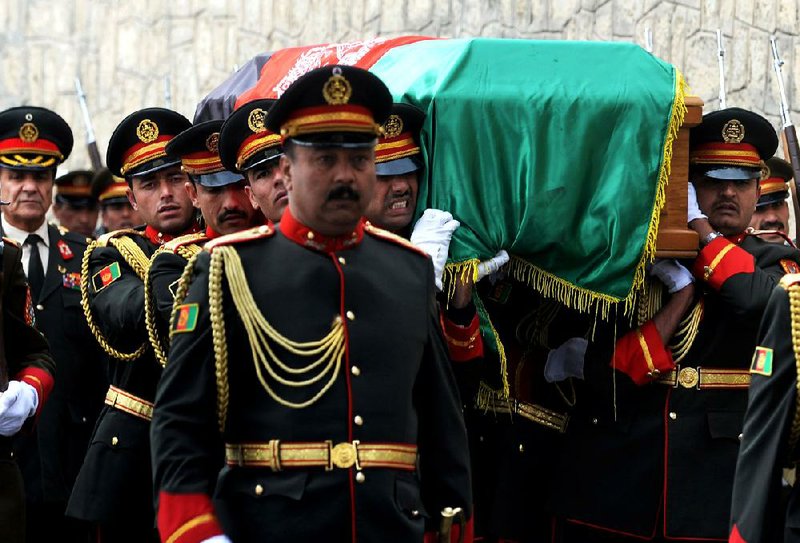KABUL, Afghanistan - A Swedish journalist was shot to death while he was out reporting in an affluent and well-guarded area in Kabul on Tuesday, highlighting fears of rising violence ahead of a crucial election to choose a new leader for the country.
Nils Horner, 51, who also had British citizenship, had worked for Swedish Radio since 2001 as a foreign correspondent mostly in Asia and the Middle East, including Afghanistan and Baghdad.
The killing came a day after the Taliban vowed “to use all force necessary” to disrupt the April 5 presidential vote, but spokesman Zabihullah Mujahid denied the Islamic militant movement was behind the attack. The shooting also occurred near the site of a Taliban assault on a Lebanese restaurant that killed 13 foreigners and eight Afghans two months ago.
“The police do not have any evidence to say who was behind this attack, but after the investigation we will know whether this incident was political or personal,” police spokesman Hashmat Stanikzai said.
The area is home to several embassies, and there was a police checkpoint about 100 yards away from where the attack occurred. Security also was tighter than usual as dignitaries gathered for the funeral of Afghanistan’s powerful Vice President Mohammad Qasim Fahim.
Suicide bombings and other attacks are frequent in Kabul and elsewhere in Afghanistan where insurgents are fighting to undermine confidence in the Western-backed government as the U.S. and allied troops prepare to end their combat mission at the end of the year.
Horner’s assassination heightened concern that insurgents may step up their campaign of violence against foreigners, which have been relatively rare in the capital.
Anne Lagercrantz, head of news at Swedish Radio, said the newsroom was in deep shock.
She said Horner spoke to the desk in Stockholm early Tuesday, and they agreed that he would go out and do interviews ahead of the election.
When people in the newsroom saw reports that a foreign journalist had been shot in Kabul, they tried to contact Horner by email but got no response. They then called his mobile phone, and a doctor answered saying Horner had been shot and killed, Lagercrantz said.
Swedish Radio chief executive Cilla Benko said Horner was very safety-conscious but was prepared to take risks.
“This was his life,” Benko said. “He didn’t want to do anything else.”
Swedish Radio officials said there were no known threats to Horner.
A guard at a restaurant across the street from where the attack happened said two young men approached the journalist as he was talking to his translator at about 11 a.m.
The guard, Mohammad Zubair, said one of the men pulled out a pistol and shot Horner in the head. He said there was a single shot and the bullet then hit a nearby Mercedes Benz.
The witness said he and other guards called the police from the checkpoint and they cordoned off the area.
Stanikzai said the two attackers were wearing military uniforms, which can easily be bought in markets and are frequently used by insurgents as disguises. He also said police were questioning the journalist’s driver and translator as part of the investigation.
Not including Horner, at least 29 journalists have been killed in Afghanistan since 1992, most after the 2001 U.S.-led ouster of the Taliban, according to the New York-based Committee to Protect Journalists.
Violence also targeted Afghans elsewhere in the country. A roadside bomb killed three health workers vaccinating children for polio in the south, said Omar Zwak, a spokesman for the governor of Helmand province. He said the blast struck a car carrying the three as they traveled between districts.
Meanwhile, thousands of flag-waving Afghans crowded into a Kabul cemetery and thronged an ambulance carrying Fahim’s flag-covered coffin to the grave site. Fahim, who died Sunday at 57, was an ethnic Tajik and a leading commander in the Northern Alliance, which battled the Taliban for years and helped the U.S. in ousting the Islamic militant movement.
At a funeral service earlier in the presidential palace, President Hamid Karzai lauded Fahim - who held the rank of field marshal and had survived several assassination attempts - for always promoting national interest.
“I lost my best friend and my brother,” Karzai said, surrounded by tribal leaders and other Afghan dignitaries and foreign diplomats. “He was always with me in making important decisions on international and domestic issues.” Information for this article was contributed by Amir Shah in Kabul, Matti Huuhtanen and Karl Ritter of The Associated Press.
Front Section, Pages 2 on 03/12/2014
